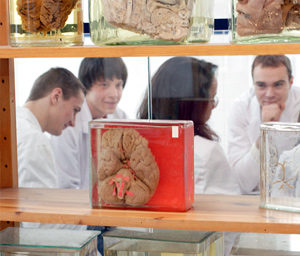Faculty of Medicine
The Faculty of Medicine in Kaunas was founded in 1922. It is the oldest and most important Faculty of the Lithuanian University of Health Sciences and consists of 30 clinical departments, 8 departments and 2 institutes. There are close to 2,550 students, including 250 international students. The international program is taught in English.
Degree in Medicine (6 years)

Upon completion of the undergraduate degree in Medicine, students are awarded with the professional qualification of Doctor.
During the first 3 years, the degree programme focuses on pre-clinical courses. In the fourth year, the focus begins to shift towards clinical disciplines. Internships take place during the sixth year of the degree programme.
Total number of ECTS credits: 360.
The degree programme is taught entirely in English.
Postgraduate programmes
Residency programmes last 3 (198 ECTS credits) to 6 years (396 ECTS credits), depending on the specialisation. Upon completion of the residency, students are awarded the professional qualification of Medicine Specialist.
Residency programmes are organised under the supervision of the Faculty and the Centre for Postgraduate Studies.
Doctoral programmes are organised under the supervision of the Faculty and the Department of Research.
Language of instruction: English
Problem-based learning (PBL) is the teaching method in the Faculty of Medicine. The PBL method was successfully implemented in the medical degree programme in 2007. PBL lessons encourage students to analyse and solve problems through research, discussions and team work. Studies in clinical medicine are organised in problem based learning approach too, integrating various clinical subjects, and are conducted in primary, secondary and tertiary medical care centres.

This learning method is more practical and it can be applied to real cases.
Subjects are taught in intensive blocks. This means that each subject is assigned a particular period of time in the course structure. Students begin the year with one subject, and focus exclusively on that subject for a specific period of time. In this period, all lessons and training are devoted to that subject. Once that particular period comes to an end, students sit the respective exams.
Students are taught in very small groups and the number of students per class is limited to 9-10 students. Students receive personalised support from teachers and tutors throughout the degree programme, which has a positive influence on academic results.
As current Medicine students of the Faculty say, the quality of the studies is very high.
Interest in the Faculty’s degree programmes increases amongst Erasmus students every year. There is an increasing number of European students from Spain, Germany, Italy, Poland, Turkey and other countries who apply to study at the Faculty.
Professionals of clinical and theoretical medicine, known throughout Europe and all over the world, share their experiences with the students of the Faculty of Medicine.






